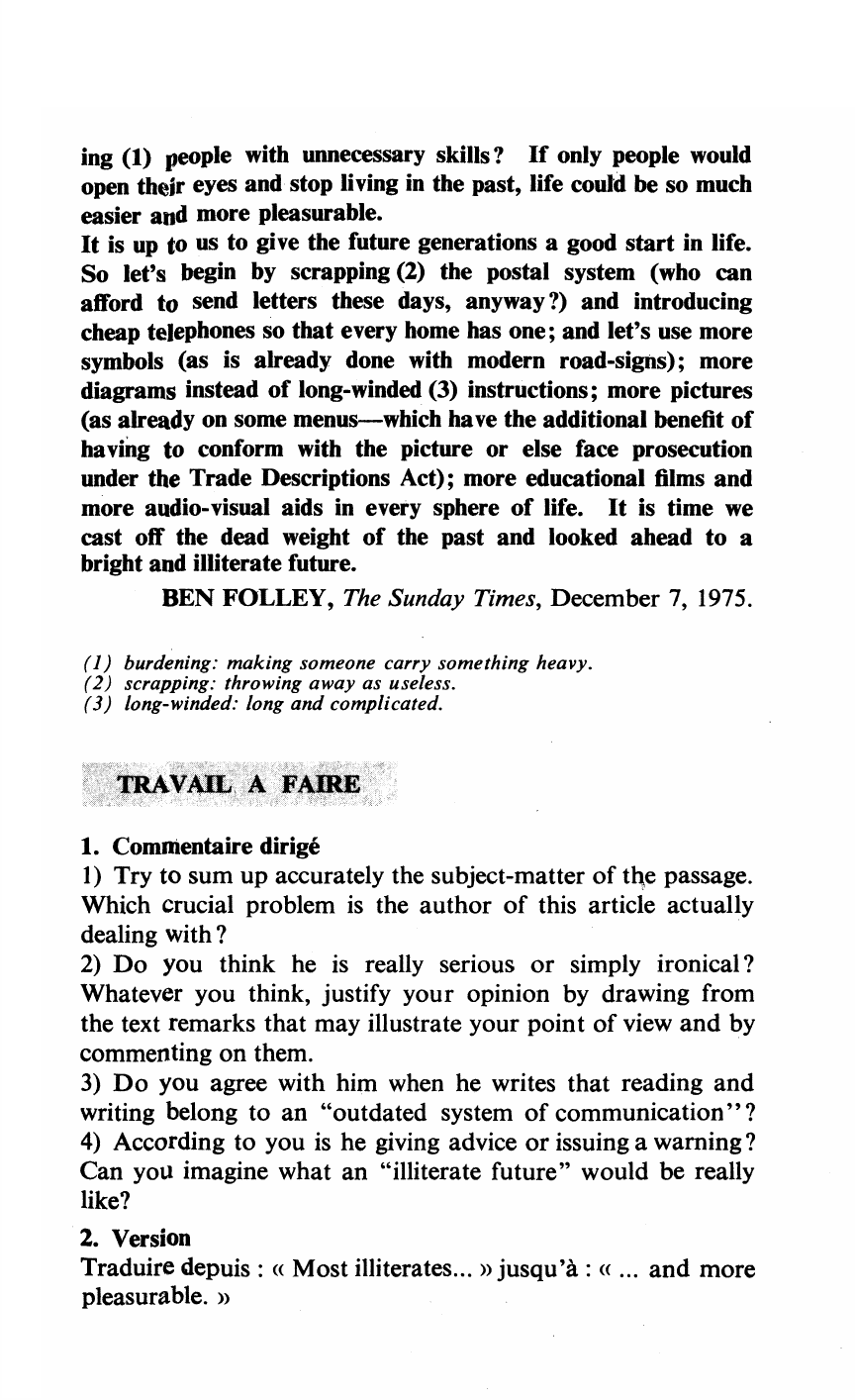WHY BE LITERATE ?
Publié le 07/02/2012

Extrait du document
It is amazing that no one seems to have questioned the validity of the principle behind the present national campaign against illiteracy. The problem is being tackled (1) in entirely the wrong way. We should be making it easier for illiterates to get by (2) without reading and writing, not encouraging them to learn our outdated system of communication. The written word should be (and most certainly soon will be) as obsolete in communications as the horse is for transport.( ... ) The people running the campaign claim that reading and writing are more necessary now than ever before, but this is simply not true-except perhaps, for the bureaucratie nonsense of taxforms and for complicated hire-purchase (3) agreements, etc, which even literateS have problems with and which would be much better dealt with by professional form-completers. We do not need reading and writing for anything else in this technological age. Tbe written word bas served its purpose, so let's have done with it (4). (... )
«
ing (1) people with unnecessary skills? H only people would
open their eyes and stop living
in the past, life could be so much
easier and more pleasurable.
It is up to us to give the future generations a good start in life.
So let's begin by scrapping (2) the postal system (who can
alford to send letters these days, anyway ?) and introducing
cheap telephones so
that every home bas one; and let's use more
symbols (as is already done with modern
road-signs); more
diagrams instead
of long-winded (3) instructions; more pictures
(as
already on sorne menus-which have the additional benefit of
having to conform with the picture or else face prosecution
under the Trade Descriptions Act); more educational films and
more audio-visual aids in every sphere
of life.
lt is time we
cast oiT the dead weight of the past and looked ahead to a
bright and illiterate future.
BEN
FOLLEY, The Sunday Times, December 7, 1975.
( 1) burdening: making someone carry something heavy.
(2) scrapping: throwing away as useless.
( 3) long-winded: long
and complicated.
1.
Commentaire dirigé
1) Try to sum up accurately the subject-matter of th,e passage.
Which crucial problem is the
author of this article actually
dealing with?
2) Do you think he is really serious or sim ply ironical?
Whatever you think, justify
your opinion by drawing from
the text remarks
that may illustra te y our point of view and by
commenting
on them.
3) Do you agree with him when he writes that reading and
writing belong to an "outdated system of communication"?
4) According to you is he giving advice or issuing a waming?
Can you imagine what an "illiterate future" would be really
like?
2.
Version
Traduire
depuis: «Most illiterates ...
»jusqu'à:« ...
and more
pleasurable.
».
»
↓↓↓ APERÇU DU DOCUMENT ↓↓↓
Liens utiles
- Why are we so fascinated by psychopaths?
- DARON ACEMOGLU AND JAMES A. ROBINSON, WHY NATIONS FAIL, CROWN BUSINESS, 2012, 529P.
- What are reasons and why do they matter in ethics?
- American Gothic painting, why is this painting one of the most famous american painting?
- “What Good Is This Thing Called Intelligence and Why Bother to Measure It?” Hilliard Response


